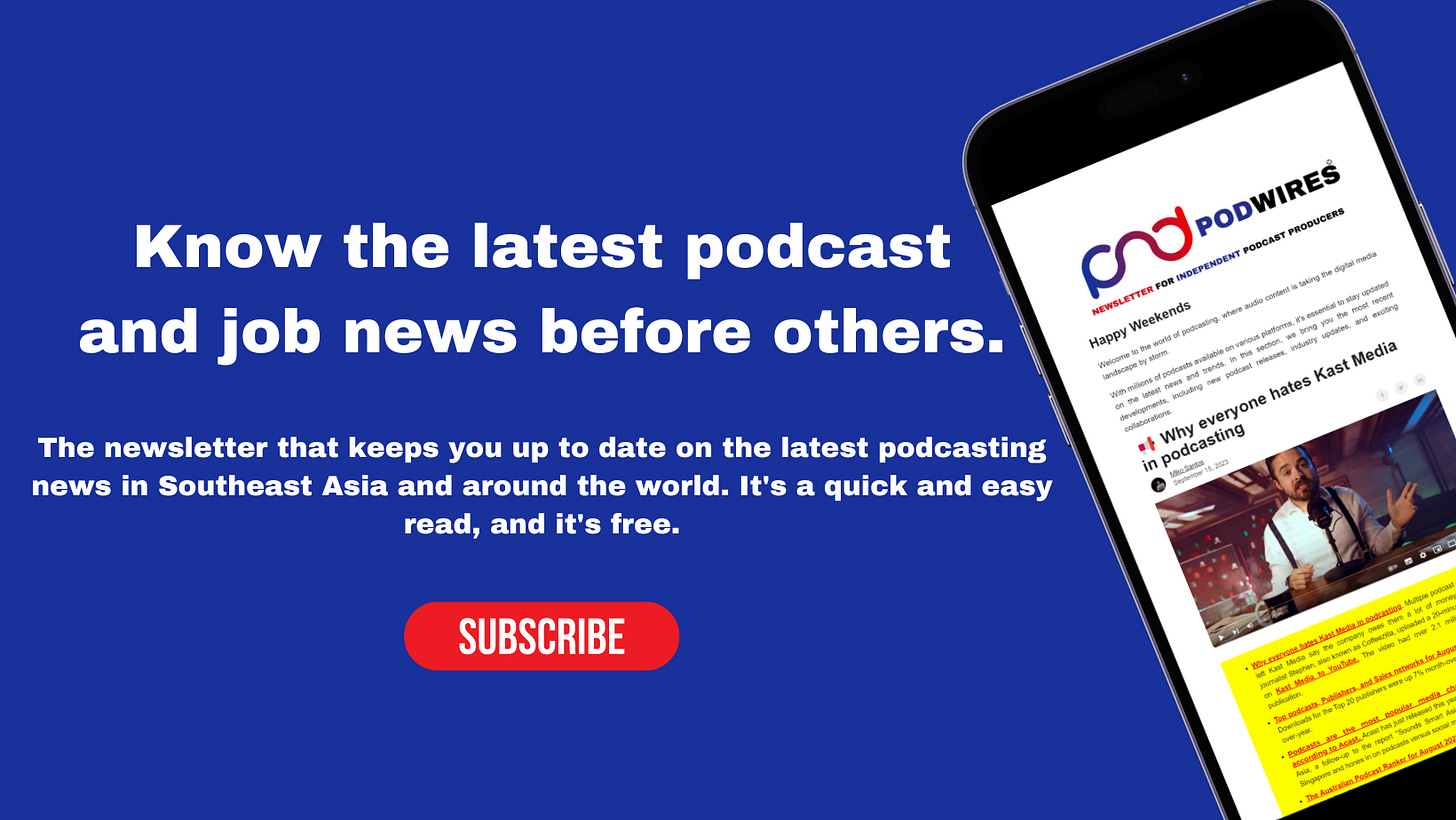📢 xAI Launches Grok 4 and Grok 4 Heavy: New AI Models Outperform OpenAI o3 and Gemini 2.5 Pro
Today’s email is brought to you by Empower your podcasting vision with a suite of creative solutions at your fingertips.
Hey, Glitchers it's Friday, July 11 and xAI’s highly anticipated Grok 4 has arrived — and it’s crushing benchmarks across the board.
If you have any thoughts or feedback, our inbox is open; contact us via email, and don't forget to sign up for this newsletter here if you haven't already. Encourage a friend to subscribe as well! - Miko Santos
In today’s There’s a Glitch :
Perplexity Launches AI-Powered Browser Comet for Max Subscribers
xAI's Grok 4 Claims Top AI Model Ranking With 73-Point Intelligence Score
OpenAI Prepares Browser Launch With Integrated ChatGPT Interface Within Weeks
Microsoft Reports $500M AI Productivity Gains Amid Workforce Reductions
Truth matters. Quality journalism costs.
Your subscription to Mencari directly funds the investigative reporting our democracy needs. For less than a coffee per week, you enable our journalists to uncover stories that powerful interests would rather keep hidden. There is no corporate influence involved. No compromises. We provide honest journalism when it's most needed.
🔥Perplexity Launches AI-Powered Browser Comet for Max Subscribers
The Breakdown: Perplexity launched Comet, an AI-native web browser that replaces traditional tab-based browsing with conversational workflows, enabling users to research, analyze, and execute tasks through natural language interactions — marking the search company's expansion into browser infrastructure with immediate availability for existing Max subscribers.
The Details
Core Architecture: Browser integrates Perplexity's search and reasoning capabilities directly into the interface, eliminating context-switching between applications and consolidating complex workflows into single conversational sessions.
Operational Capabilities: Assistant handles complete browsing workflows including comparative research, meeting scheduling, email composition, and purchase transactions while maintaining contextual awareness across multiple sites and tasks.
Access Structure: Limited launch to Perplexity Max subscribers beginning July 9, 2025, with invite-only expansion planned over summer months; new users receive limited invitation allocation for controlled scaling.
Technical Foundation: Built on Perplexity's accuracy-focused infrastructure, emphasizing trustworthy information retrieval for decision-making scenarios including financial analysis, technology evaluation, and comparative shopping.
Intelligence Layer: Browser learns individual user patterns and thinking processes to provide personalized assistance, with text highlighting for instant explanations and tangential exploration without losing original context.
Why It Matters: Comet represents a fundamental shift from information consumption to augmented cognition, positioning Perplexity to compete directly with established browser infrastructure while leveraging its AI capabilities advantage.
The launch challenges the traditional browser paradigm dominated by Google Chrome and Mozilla Firefox by introducing native AI integration rather than bolt-on extensions.
While the invite-only rollout suggests cautious scaling, the browser's emphasis on accuracy and decision-making support targets high-value use cases where AI reliability becomes critical. This positions Perplexity to capture increasing AI-driven web interaction patterns as users demand more intelligent interfaces for complex online workflows.
🤖 xAI's Grok 4 Claims Top AI Model Ranking With 73-Point Intelligence Score
The Breakdown: xAI's Grok 4 just secured the top position in comprehensive AI benchmarking with a 73-point Intelligence Index score, outperforming OpenAI's o3, Google's Gemini 2.5 Pro, and Anthropic's Claude 4 Opus — marking the first time Elon Musk's AI lab has achieved frontier leadership.
The Details
• Performance Leadership: Grok 4 achieved record-breaking scores across multiple domains, including 88% on GPQA Diamond (scientific reasoning) and 24% on Humanity's Last Exam, while leading the Coding Index and Math Index categories with joint-highest scores of 87% on MMLU-Pro and 94% on AIME 2024.
• Technical Specifications: The reasoning model operates with a 256k token context window, supports multimodal input (text and images), function calling, and structured outputs, while delivering 75 output tokens per second — faster than Claude 4 Opus but slower than competing models like o3 and Gemini 2.5 Pro.
• Pricing and Availability: Priced at $3/$15 per million input/output tokens with $0.75 cached input pricing, matching Claude 4 Sonnet's cost structure while remaining more expensive than Gemini 2.5 Pro ($1.25/$10) and o3 ($2/$8), with deployment across xAI API, X platform integration, and potential Microsoft Azure availability.
• Reasoning Architecture: As a reasoning model, Grok 4 processes queries through internal "thinking" phases before generating responses, though the xAI API doesn't expose these reasoning tokens to users, potentially affecting total computational costs versus competitors.
Why It Matters: This breakthrough represents a significant shift in AI competitive dynamics, with xAI moving from competitive parity to clear leadership in just one generation leap from Grok 3. The achievement validates alternative approaches to AI development outside the traditional OpenAI-Google-Anthropic triumvirate, demonstrating that focused investment in reasoning capabilities can yield measurable performance advantages across diverse evaluation criteria.
However, Grok 4's success comes with trade-offs in processing speed and cost efficiency that may limit adoption in latency-sensitive applications. The model's strength in reasoning tasks positions it particularly well for complex analytical workloads where accuracy trumps speed, potentially carving out a premium market segment.
The timing coincides with intensifying competition in reasoning models, suggesting that sustained leadership will require continued innovation as competitors respond with their own architectural advances and the broader market validates whether reasoning-first approaches represent the optimal path toward artificial general intelligence.
🚨 Microsoft Reports $500M AI Productivity Gains Amid Workforce Reductions
The Breakdown: Microsoft just demonstrated $500 million in measurable AI productivity gains through internal deployment across core business functions, showcasing tangible ROI from artificial intelligence investments — even as the company executes concurrent workforce reduction initiatives affecting thousands of employees.
The Details
• Productivity Metrics: Chief Commercial Officer Judson Althoff presented comprehensive data showing AI tool implementation delivering quantifiable efficiency improvements across sales operations, customer service workflows, and software engineering processes, with the $500 million figure representing direct cost savings and productivity enhancements.
• Implementation Scope: The productivity gains span multiple operational domains, indicating broad-based AI integration rather than isolated use cases, suggesting systematic deployment of AI tools throughout Microsoft's internal operations infrastructure.
• Workforce Context: These AI efficiency demonstrations occur simultaneously with ongoing workforce reduction programs affecting thousands of personnel, creating a direct operational narrative connecting AI capability expansion with traditional headcount optimization strategies.
• Internal Positioning: The presentation format suggests Microsoft is actively communicating AI transformation benefits to remaining employees, potentially serving dual purposes of demonstrating technology value while providing strategic context for organizational restructuring decisions.
Why It Matters: This development illustrates the practical realization of AI's promised productivity revolution within enterprise operations, moving beyond theoretical benefits to documented financial impact at scale. Microsoft's ability to quantify $500 million in savings provides concrete validation for AI investment strategies across the technology sector and establishes measurable benchmarks for AI-driven operational efficiency.
However, the timing alongside workforce reductions highlights the complex socioeconomic implications of AI adoption, where technological productivity gains directly correlate with traditional employment displacement. This creates a strategic communications challenge for technology companies seeking to promote AI benefits while managing workforce transitions.
The disclosure also positions Microsoft as a practical case study for AI implementation ROI, potentially influencing enterprise adoption decisions while demonstrating how leading technology companies are navigating the transition from AI experimentation to operational integration with measurable business impact.
🚀 OpenAI Prepares Browser Launch With Integrated ChatGPT Interface Within Weeks
The Breakdown: OpenAI is preparing to launch an unnamed web browser with native AI integration and ChatGPT interface functionality, targeting deployment within the coming weeks — representing a strategic expansion beyond conversational AI into fundamental internet infrastructure competition with Google Chrome.
The Details
• Core Architecture: The browser will feature native ChatGPT interface integration, built-in AI agent functionality including Operator (automated browsing task execution), and seamless integration with existing ChatGPT Search capabilities currently available as Chrome extension.
• Technical Integration: Expected deployment of direct AI agent embedding within browsing workflows, enabling automated task completion and intelligent search functionality without external plugin dependencies or third-party integration requirements.
• User Base Leverage: Strategic positioning to capitalize on ChatGPT's 500 million weekly active users for rapid browser adoption, creating potential for immediate market penetration against established browser ecosystems.
• Development Timeline: Reuters reports indicate near-completion status with launch preparation in final stages, suggesting extensive internal testing and optimization phases have concluded for production-ready deployment.
Why It Matters: This launch represents OpenAI's strategic pivot toward platform-level internet infrastructure control, moving beyond standalone AI applications to integrated browsing experiences that could fundamentally alter user interaction with web content. The timing coincides with Google's antitrust challenges and potential Chrome divestiture discussions, creating market opportunity for alternative browser ecosystems.
The browser's success depends on OpenAI's ability to differentiate AI-native browsing from traditional browser-plus-extension approaches, while managing the technical complexity of seamless AI integration without compromising performance or user experience standards.
Long-term implications include potential data collection advantages for AI model training, direct competition with Google's search advertising revenue model, and establishment of OpenAI as a comprehensive internet platform rather than specialized AI tool provider, fundamentally reshaping competitive dynamics in both AI and browser markets
👉 If you're looking to get up to speed with podcasting in South-east Asia and around the globe in just five minutes, this is the perfect place for you! Just click here.
X CEO Linda Yaccarino Resigns After Two Years of Platform Decline and Failed Promises. Linda Yaccarino resigned as X CEO in July 2025 after failing to deliver on her promises to protect free speech, turn around the struggling social media platform formerly known as Twitter, and transform it into Elon Musk's vision of an "Everything App," leaving the company in a worse financial and operational state than when she began her tenure two years ago.
China Expands AI Partnerships with Brazil and Australia Amid US Semiconductor Trade Restrictions in 2025. China is expanding artificial intelligence partnerships with Brazil and Australia in 2025, focusing on agricultural AI applications and technology sharing agreements as the Asian superpower seeks alternative collaboration pathways amid ongoing US trade restrictions on semiconductor access that have limited Chinese AI development capabilities.
Australian Organizations Must Prioritize Reskilling as AI Automation Threatens 32% of HR Jobs by 2030. Australian organizations face urgent pressure to prioritize employee reskilling and upskilling initiatives as new research reveals 44% of workers now consider professional development their top workplace priority, while 32% of HR professionals fear AI automation could replace their roles within five years amid projections that 39% of core job skills will change by 2030.
Intuit and American Express Deploy Autonomous AI Agents Beyond Chatbots, Achieve 12% Performance Gains. Major enterprises including Intuit and American Express are transitioning from experimental AI chatbots to production-ready autonomous agents, with Intuit's GenOS platform enabling TurboTax customers to complete taxes 12% faster while American Express deploys modular governance frameworks and enablement layers to ensure rapid, secure agent development across internal workflows and customer experiences.
Chinese Researchers Launch MemOS: First AI Memory Operating System Delivers 159% Performance Boost Over OpenAI. Chinese researchers from Shanghai Jiao Tong University and Zhejiang University have developed MemOS, the first memory operating system for artificial intelligence that enables human-like persistent recall through standardized "MemCubes" memory units, delivering a 159% improvement in temporal reasoning tasks compared to OpenAI's memory systems while addressing the critical "memory silo" problem that prevents AI models from maintaining coherent long-term relationships and context across conversations.
Any news tip ?
A journalist's credibility is based on their sources and advice. Contact our editor via Proton Mail encryption, X Direct Message, LinkedIn, or email. You can securely message him on Signal by using his username, Miko Santos.
More on Mencari
The Evening Post AU —for nightly bite-sized news around Australia and the world.
Podwires Daily—for providing news about audio trends and podcasts.
There’s a Glitch—updated tech news and scam and fraud trends
Viewpoint 360 - An investigative report based on evidence, produced in collaboration with 360info.
Part8A Podcast features expert interviews on current political and social issues in Australia and worldwide.
Readers of There’s a Glitch receive journalism free from financial and political influence.
We set our news agenda, which is always based on facts rather than billionaire ownership or political pressure. Despite the financial challenges that our industry faces, we have decided to keep our reporting open to the public because we believe that everyone has the right to know the truth about the events that shape their world.
Thanks to the support of our readers, we can continue to provide free reporting. If you can, please choose to support The Mencari.
It only takes a minute to help us investigate fearlessly and expose lies and wrongdoing to hold power accountable. Thanks!














